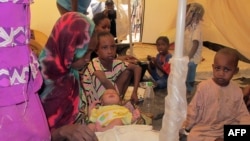Cameroon is home to about 200,000 Central African Republic (C.A.R.) refugees who fled the carnage in their country. As the C.A.R. prepares for next week’s National Reconciliation Forum, VOA spoke to some refugees in Cameroon to learn what they expect from the initiative.
Belmonde Houze, a 35-year old emissary and cleric from the C.A.R., spoke to his country's refugees in Cameroon's capital, Yaoundé, about the reconciliation process to recover from more than two years of sectarian violence.
But his audience was mostly pessimistic.
One of these refugees is car washer Ansleme Blaise Kaminga who says he is still traumatized by the brutal murder of his wife and three children in Bangui. He is not interested in a reconciliation which he believes may free those responsible for the bloodshed.
He says no matter the outcome of the reconciliation process, he will never return to his country because he’s lost all of his family.
David Zamngang, is a former student at the University of Bangui and is now a night watchman in Yaounde. For him, the most important priority is getting a credible government so that the healing begins at home rather than as an initiative of the international community.
He says any country that wants to develop must start by organizing elections in which its citizenry freely choses who will represent them. He says he also expects accountability from holders of public office.
Hawker Simon Pierre Magdongu, who also fled from the University of Bangui where he studied history, is not hopeful. He says his country has a history of political division and he doesn’t see solutions.
He says what the world is expecting from C.A.R. interim President Catherine Samba-Panza, has never been achieved under her predecessors. He has no plans to return home because of galloping youth unemployment and poor pay for the few who have jobs.
Groundnut retailer Djenge Dianne, who fled Bangui a year ago, says she doesn’t think reconciliation is possible.
She says she has seen so many reconciliations but her country has never been at peace since she was born. She says no reconciliation can replace all her family and friends killed by ruthless people.
One of the few voices of hope among those VOA spoke to was a refugee who took part in the violence.
Gilliberi Dimanga, who says he fought with one of the rival factions before escaping to Cameroon, says it is high time to stop the rivalry and work for the development of their war ravaged country.
He says he regrets he was deceived into killing innocent people and adds that he is praying for peace and wants his fellow citizens to show the courage needed for reconciliation.
Aid workers here say they are hoping for major progress so refugees can return home. Ngu Paul Simon, with the NGO “Friends of Refugees” or FOR, says some refugees are ready to return.
"Some of the refugees have come to us asking for transport to go back to their country when they so desire and most of them either want to go to school and so on so we sponsor them," said Simon.
Conflict began in C.A.R. in 2013, after mostly Muslim Seleka rebels overthrew the government, leading to reprisals from Christians who formed anti-balaka militias. Most of the victims were civilians.
Current efforts to reconcile rival factions are sponsored by the European Union and the United Nations.




